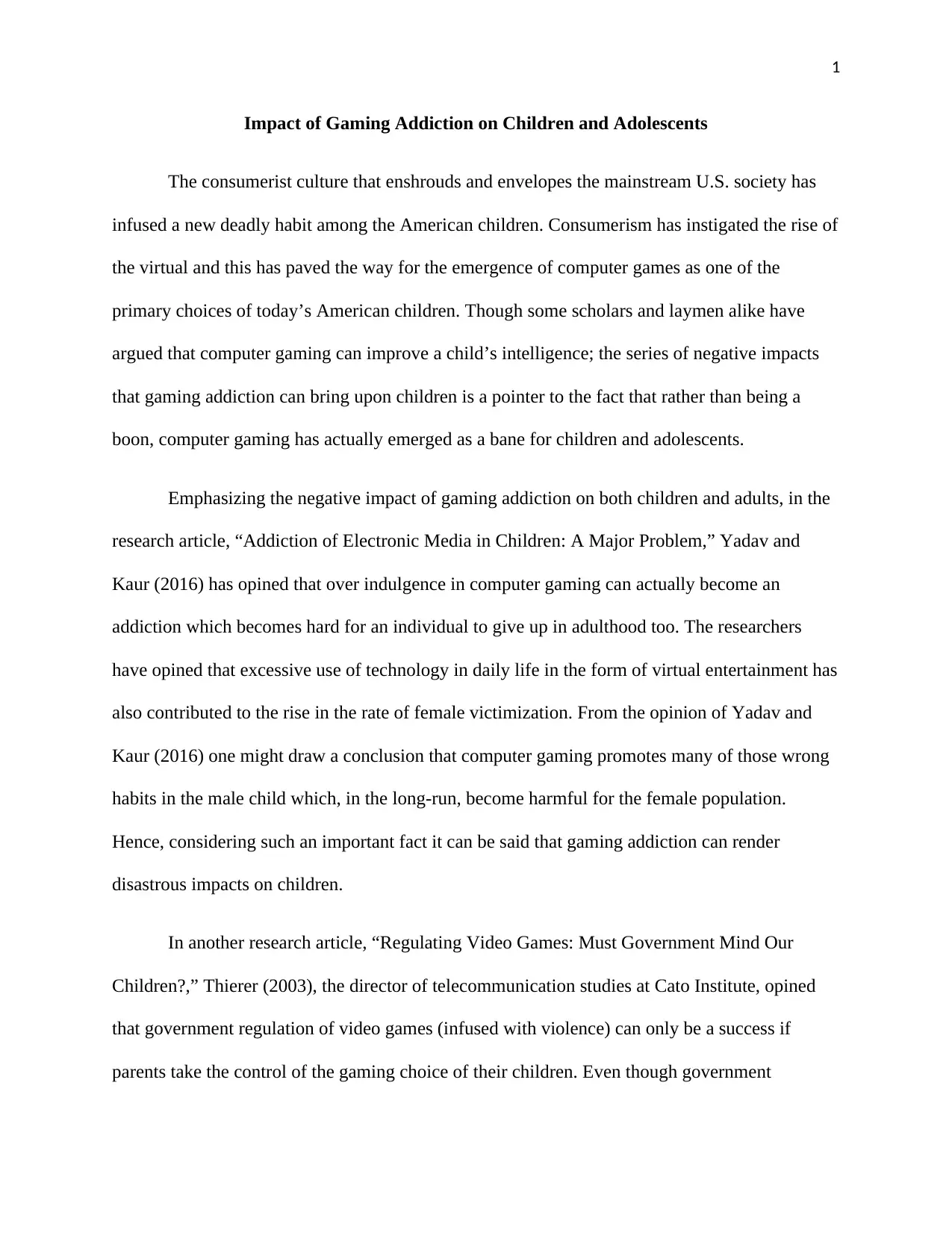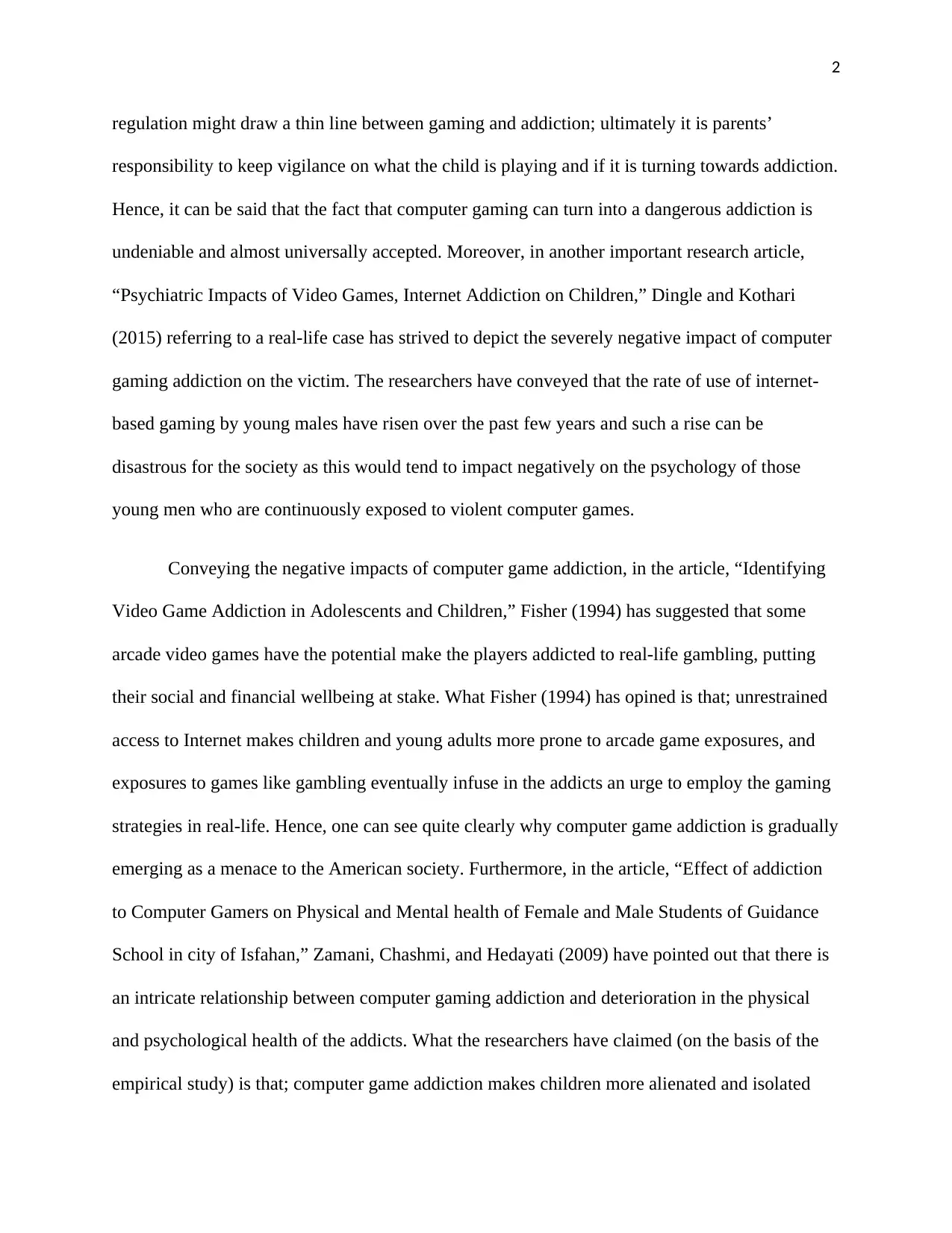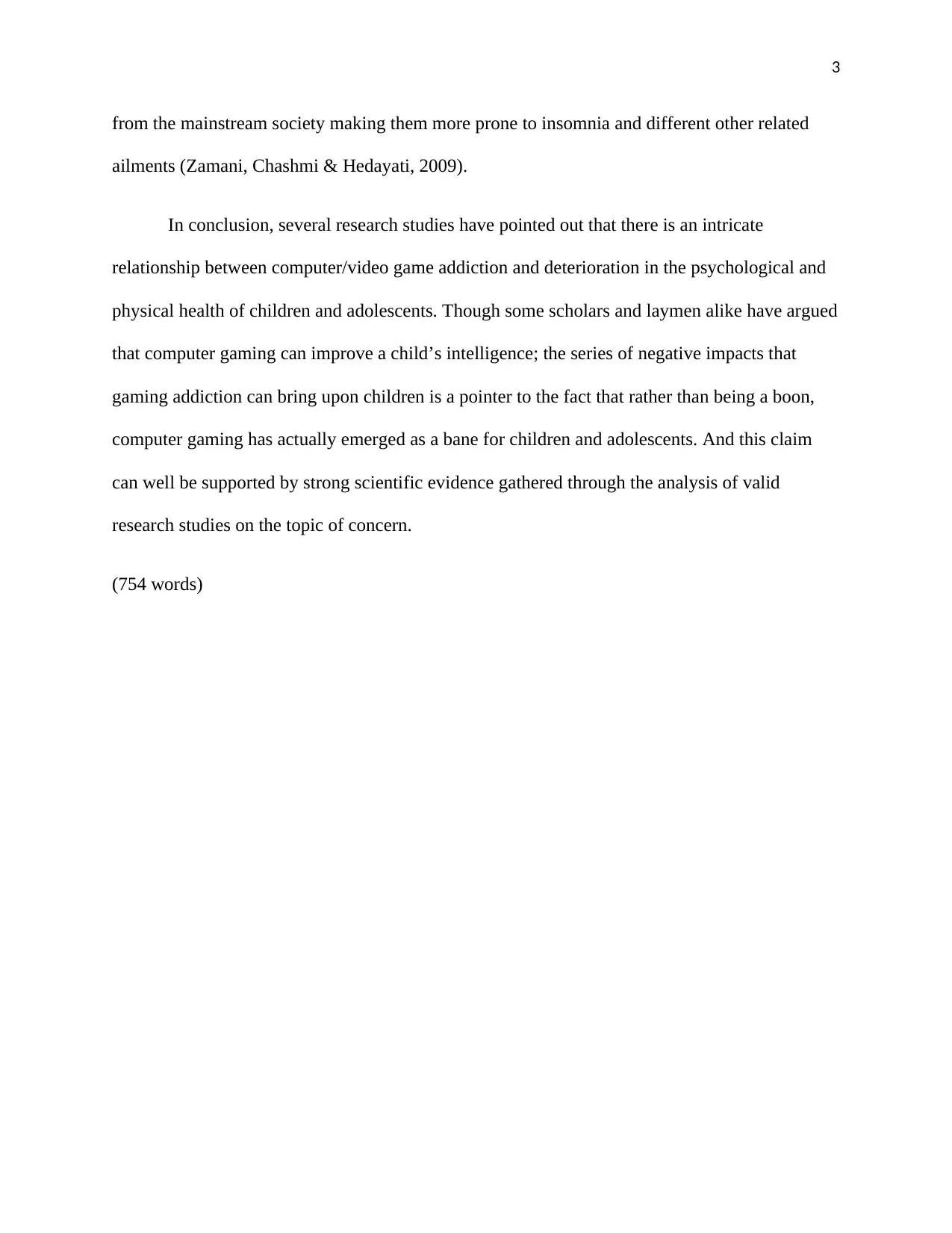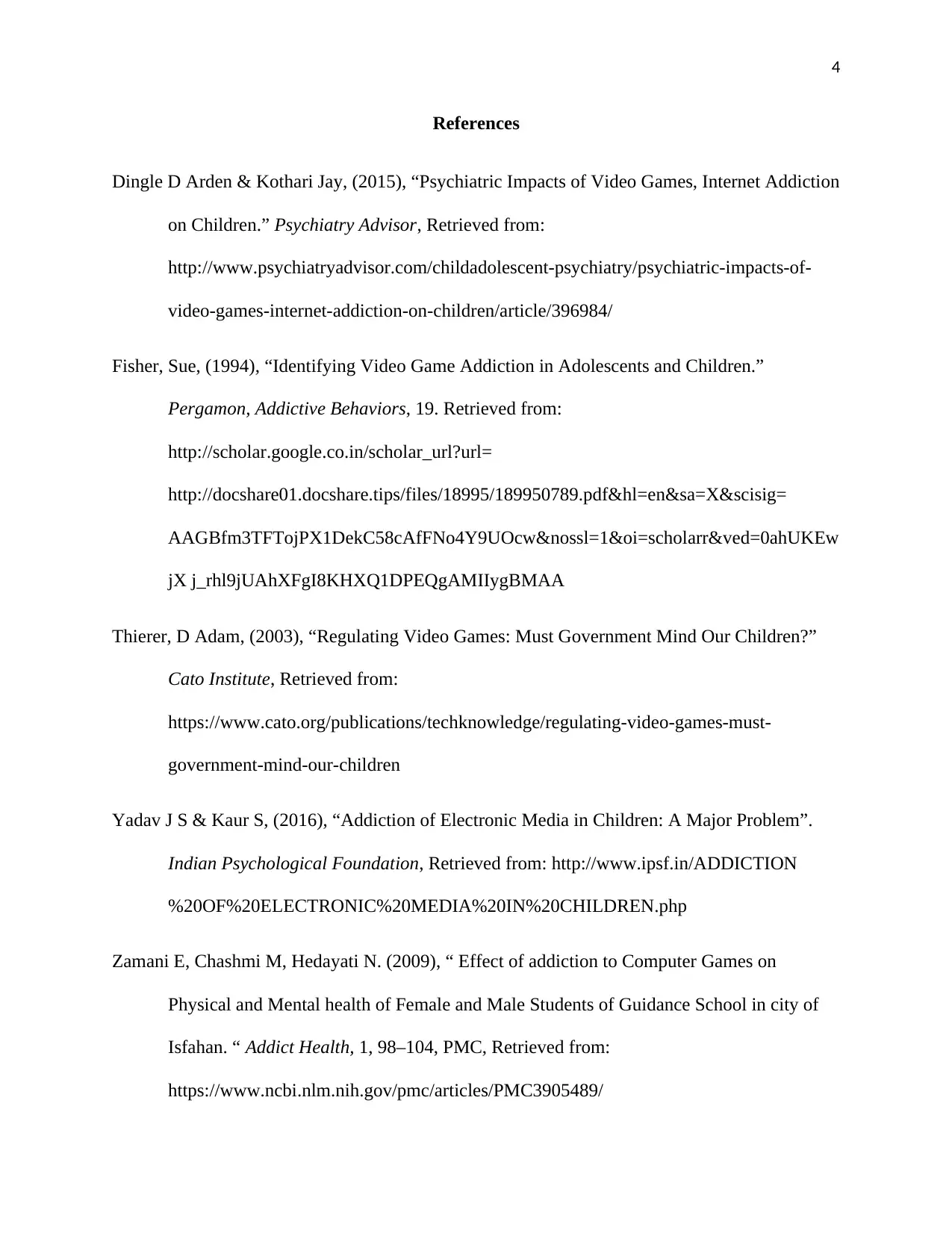The Detrimental Impact of Gaming Addiction on Children and Adolescents
VerifiedAdded on 2019/10/01
|5
|1073
|317
Essay
AI Summary
This essay delves into the pervasive issue of gaming addiction and its detrimental effects on children and adolescents. It synthesizes research from multiple sources to highlight the negative impacts of excessive gaming, including potential for addiction, psychological issues, and physical health deterioration. The essay explores the influence of consumer culture and the rise of virtual entertainment, emphasizing the risks associated with internet-based gaming and violent content. It references studies that link gaming addiction to mental health problems, social isolation, and even real-life gambling tendencies. The essay also discusses the roles of parents and government in regulating gaming habits and protecting young people from addiction. Overall, the essay argues that gaming addiction poses a significant threat to the well-being of children and adolescents, supported by scientific evidence from various research articles.

1
Impact of Gaming Addiction on Children and Adolescents
The consumerist culture that enshrouds and envelopes the mainstream U.S. society has
infused a new deadly habit among the American children. Consumerism has instigated the rise of
the virtual and this has paved the way for the emergence of computer games as one of the
primary choices of today’s American children. Though some scholars and laymen alike have
argued that computer gaming can improve a child’s intelligence; the series of negative impacts
that gaming addiction can bring upon children is a pointer to the fact that rather than being a
boon, computer gaming has actually emerged as a bane for children and adolescents.
Emphasizing the negative impact of gaming addiction on both children and adults, in the
research article, “Addiction of Electronic Media in Children: A Major Problem,” Yadav and
Kaur (2016) has opined that over indulgence in computer gaming can actually become an
addiction which becomes hard for an individual to give up in adulthood too. The researchers
have opined that excessive use of technology in daily life in the form of virtual entertainment has
also contributed to the rise in the rate of female victimization. From the opinion of Yadav and
Kaur (2016) one might draw a conclusion that computer gaming promotes many of those wrong
habits in the male child which, in the long-run, become harmful for the female population.
Hence, considering such an important fact it can be said that gaming addiction can render
disastrous impacts on children.
In another research article, “Regulating Video Games: Must Government Mind Our
Children?,” Thierer (2003), the director of telecommunication studies at Cato Institute, opined
that government regulation of video games (infused with violence) can only be a success if
parents take the control of the gaming choice of their children. Even though government
Impact of Gaming Addiction on Children and Adolescents
The consumerist culture that enshrouds and envelopes the mainstream U.S. society has
infused a new deadly habit among the American children. Consumerism has instigated the rise of
the virtual and this has paved the way for the emergence of computer games as one of the
primary choices of today’s American children. Though some scholars and laymen alike have
argued that computer gaming can improve a child’s intelligence; the series of negative impacts
that gaming addiction can bring upon children is a pointer to the fact that rather than being a
boon, computer gaming has actually emerged as a bane for children and adolescents.
Emphasizing the negative impact of gaming addiction on both children and adults, in the
research article, “Addiction of Electronic Media in Children: A Major Problem,” Yadav and
Kaur (2016) has opined that over indulgence in computer gaming can actually become an
addiction which becomes hard for an individual to give up in adulthood too. The researchers
have opined that excessive use of technology in daily life in the form of virtual entertainment has
also contributed to the rise in the rate of female victimization. From the opinion of Yadav and
Kaur (2016) one might draw a conclusion that computer gaming promotes many of those wrong
habits in the male child which, in the long-run, become harmful for the female population.
Hence, considering such an important fact it can be said that gaming addiction can render
disastrous impacts on children.
In another research article, “Regulating Video Games: Must Government Mind Our
Children?,” Thierer (2003), the director of telecommunication studies at Cato Institute, opined
that government regulation of video games (infused with violence) can only be a success if
parents take the control of the gaming choice of their children. Even though government
Paraphrase This Document
Need a fresh take? Get an instant paraphrase of this document with our AI Paraphraser

2
regulation might draw a thin line between gaming and addiction; ultimately it is parents’
responsibility to keep vigilance on what the child is playing and if it is turning towards addiction.
Hence, it can be said that the fact that computer gaming can turn into a dangerous addiction is
undeniable and almost universally accepted. Moreover, in another important research article,
“Psychiatric Impacts of Video Games, Internet Addiction on Children,” Dingle and Kothari
(2015) referring to a real-life case has strived to depict the severely negative impact of computer
gaming addiction on the victim. The researchers have conveyed that the rate of use of internet-
based gaming by young males have risen over the past few years and such a rise can be
disastrous for the society as this would tend to impact negatively on the psychology of those
young men who are continuously exposed to violent computer games.
Conveying the negative impacts of computer game addiction, in the article, “Identifying
Video Game Addiction in Adolescents and Children,” Fisher (1994) has suggested that some
arcade video games have the potential make the players addicted to real-life gambling, putting
their social and financial wellbeing at stake. What Fisher (1994) has opined is that; unrestrained
access to Internet makes children and young adults more prone to arcade game exposures, and
exposures to games like gambling eventually infuse in the addicts an urge to employ the gaming
strategies in real-life. Hence, one can see quite clearly why computer game addiction is gradually
emerging as a menace to the American society. Furthermore, in the article, “Effect of addiction
to Computer Gamers on Physical and Mental health of Female and Male Students of Guidance
School in city of Isfahan,” Zamani, Chashmi, and Hedayati (2009) have pointed out that there is
an intricate relationship between computer gaming addiction and deterioration in the physical
and psychological health of the addicts. What the researchers have claimed (on the basis of the
empirical study) is that; computer game addiction makes children more alienated and isolated
regulation might draw a thin line between gaming and addiction; ultimately it is parents’
responsibility to keep vigilance on what the child is playing and if it is turning towards addiction.
Hence, it can be said that the fact that computer gaming can turn into a dangerous addiction is
undeniable and almost universally accepted. Moreover, in another important research article,
“Psychiatric Impacts of Video Games, Internet Addiction on Children,” Dingle and Kothari
(2015) referring to a real-life case has strived to depict the severely negative impact of computer
gaming addiction on the victim. The researchers have conveyed that the rate of use of internet-
based gaming by young males have risen over the past few years and such a rise can be
disastrous for the society as this would tend to impact negatively on the psychology of those
young men who are continuously exposed to violent computer games.
Conveying the negative impacts of computer game addiction, in the article, “Identifying
Video Game Addiction in Adolescents and Children,” Fisher (1994) has suggested that some
arcade video games have the potential make the players addicted to real-life gambling, putting
their social and financial wellbeing at stake. What Fisher (1994) has opined is that; unrestrained
access to Internet makes children and young adults more prone to arcade game exposures, and
exposures to games like gambling eventually infuse in the addicts an urge to employ the gaming
strategies in real-life. Hence, one can see quite clearly why computer game addiction is gradually
emerging as a menace to the American society. Furthermore, in the article, “Effect of addiction
to Computer Gamers on Physical and Mental health of Female and Male Students of Guidance
School in city of Isfahan,” Zamani, Chashmi, and Hedayati (2009) have pointed out that there is
an intricate relationship between computer gaming addiction and deterioration in the physical
and psychological health of the addicts. What the researchers have claimed (on the basis of the
empirical study) is that; computer game addiction makes children more alienated and isolated

3
from the mainstream society making them more prone to insomnia and different other related
ailments (Zamani, Chashmi & Hedayati, 2009).
In conclusion, several research studies have pointed out that there is an intricate
relationship between computer/video game addiction and deterioration in the psychological and
physical health of children and adolescents. Though some scholars and laymen alike have argued
that computer gaming can improve a child’s intelligence; the series of negative impacts that
gaming addiction can bring upon children is a pointer to the fact that rather than being a boon,
computer gaming has actually emerged as a bane for children and adolescents. And this claim
can well be supported by strong scientific evidence gathered through the analysis of valid
research studies on the topic of concern.
(754 words)
from the mainstream society making them more prone to insomnia and different other related
ailments (Zamani, Chashmi & Hedayati, 2009).
In conclusion, several research studies have pointed out that there is an intricate
relationship between computer/video game addiction and deterioration in the psychological and
physical health of children and adolescents. Though some scholars and laymen alike have argued
that computer gaming can improve a child’s intelligence; the series of negative impacts that
gaming addiction can bring upon children is a pointer to the fact that rather than being a boon,
computer gaming has actually emerged as a bane for children and adolescents. And this claim
can well be supported by strong scientific evidence gathered through the analysis of valid
research studies on the topic of concern.
(754 words)
⊘ This is a preview!⊘
Do you want full access?
Subscribe today to unlock all pages.

Trusted by 1+ million students worldwide

4
References
Dingle D Arden & Kothari Jay, (2015), “Psychiatric Impacts of Video Games, Internet Addiction
on Children.” Psychiatry Advisor, Retrieved from:
http://www.psychiatryadvisor.com/childadolescent-psychiatry/psychiatric-impacts-of-
video-games-internet-addiction-on-children/article/396984/
Fisher, Sue, (1994), “Identifying Video Game Addiction in Adolescents and Children.”
Pergamon, Addictive Behaviors, 19. Retrieved from:
http://scholar.google.co.in/scholar_url?url=
http://docshare01.docshare.tips/files/18995/189950789.pdf&hl=en&sa=X&scisig=
AAGBfm3TFTojPX1DekC58cAfFNo4Y9UOcw&nossl=1&oi=scholarr&ved=0ahUKEw
jX j_rhl9jUAhXFgI8KHXQ1DPEQgAMIIygBMAA
Thierer, D Adam, (2003), “Regulating Video Games: Must Government Mind Our Children?”
Cato Institute, Retrieved from:
https://www.cato.org/publications/techknowledge/regulating-video-games-must-
government-mind-our-children
Yadav J S & Kaur S, (2016), “Addiction of Electronic Media in Children: A Major Problem”.
Indian Psychological Foundation, Retrieved from: http://www.ipsf.in/ADDICTION
%20OF%20ELECTRONIC%20MEDIA%20IN%20CHILDREN.php
Zamani E, Chashmi M, Hedayati N. (2009), “ Effect of addiction to Computer Games on
Physical and Mental health of Female and Male Students of Guidance School in city of
Isfahan. “ Addict Health, 1, 98–104, PMC, Retrieved from:
https://www.ncbi.nlm.nih.gov/pmc/articles/PMC3905489/
References
Dingle D Arden & Kothari Jay, (2015), “Psychiatric Impacts of Video Games, Internet Addiction
on Children.” Psychiatry Advisor, Retrieved from:
http://www.psychiatryadvisor.com/childadolescent-psychiatry/psychiatric-impacts-of-
video-games-internet-addiction-on-children/article/396984/
Fisher, Sue, (1994), “Identifying Video Game Addiction in Adolescents and Children.”
Pergamon, Addictive Behaviors, 19. Retrieved from:
http://scholar.google.co.in/scholar_url?url=
http://docshare01.docshare.tips/files/18995/189950789.pdf&hl=en&sa=X&scisig=
AAGBfm3TFTojPX1DekC58cAfFNo4Y9UOcw&nossl=1&oi=scholarr&ved=0ahUKEw
jX j_rhl9jUAhXFgI8KHXQ1DPEQgAMIIygBMAA
Thierer, D Adam, (2003), “Regulating Video Games: Must Government Mind Our Children?”
Cato Institute, Retrieved from:
https://www.cato.org/publications/techknowledge/regulating-video-games-must-
government-mind-our-children
Yadav J S & Kaur S, (2016), “Addiction of Electronic Media in Children: A Major Problem”.
Indian Psychological Foundation, Retrieved from: http://www.ipsf.in/ADDICTION
%20OF%20ELECTRONIC%20MEDIA%20IN%20CHILDREN.php
Zamani E, Chashmi M, Hedayati N. (2009), “ Effect of addiction to Computer Games on
Physical and Mental health of Female and Male Students of Guidance School in city of
Isfahan. “ Addict Health, 1, 98–104, PMC, Retrieved from:
https://www.ncbi.nlm.nih.gov/pmc/articles/PMC3905489/
Paraphrase This Document
Need a fresh take? Get an instant paraphrase of this document with our AI Paraphraser

5
1 out of 5
Related Documents
Your All-in-One AI-Powered Toolkit for Academic Success.
+13062052269
info@desklib.com
Available 24*7 on WhatsApp / Email
![[object Object]](/_next/static/media/star-bottom.7253800d.svg)
Unlock your academic potential
Copyright © 2020–2026 A2Z Services. All Rights Reserved. Developed and managed by ZUCOL.



